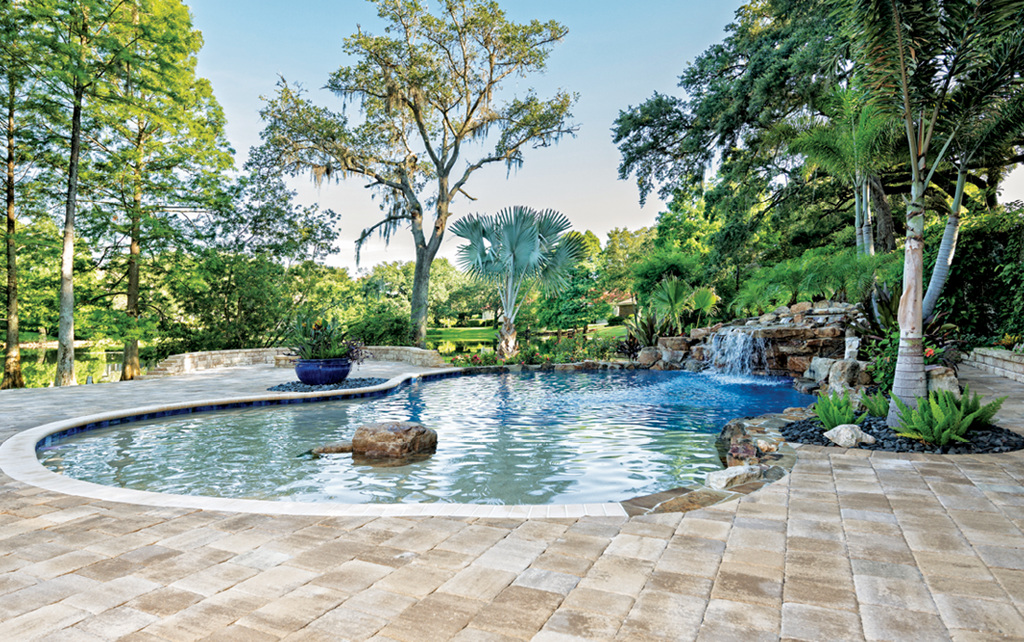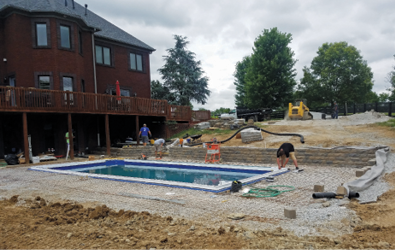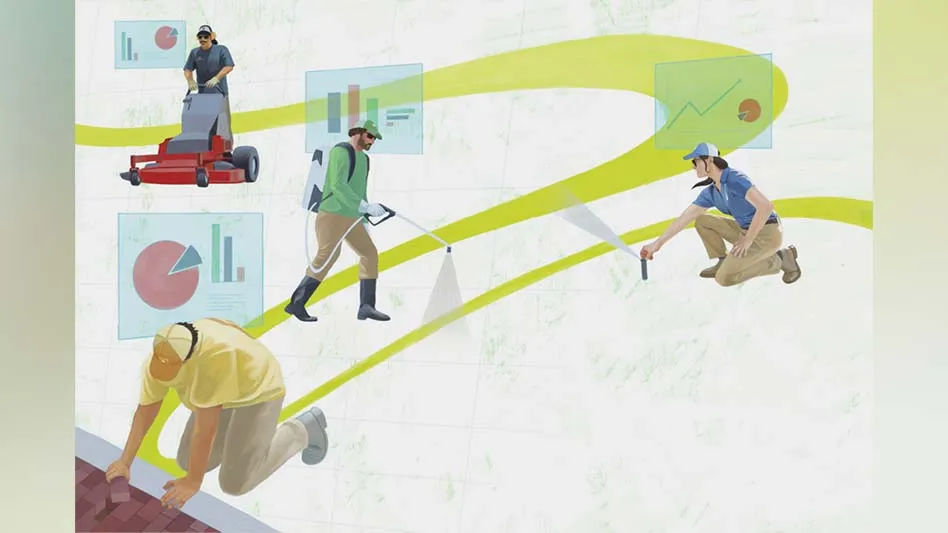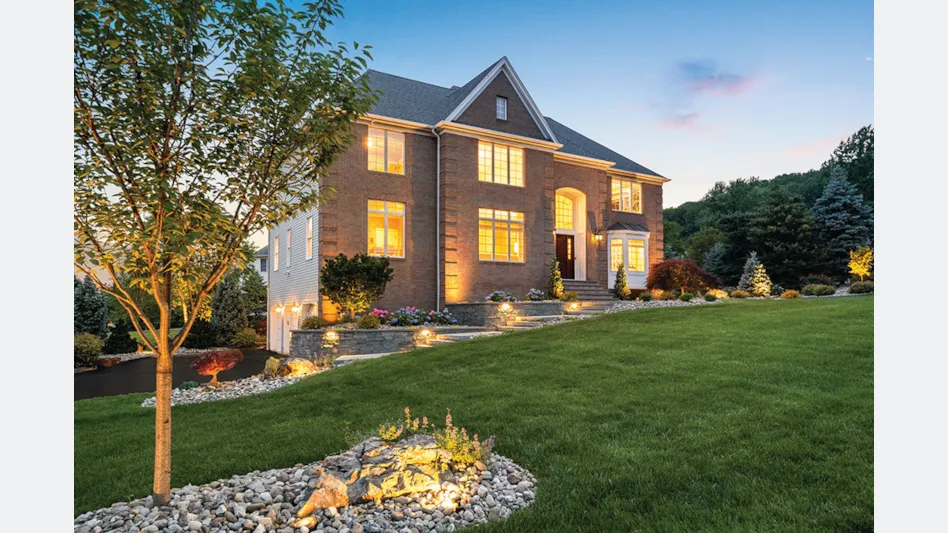
A pool is the focal point of an outdoor living space.
It’s the foundation from which the rest of the landscape design evolves. For many contractors, that’s why they’ve chosen to add the service to their business rather than subbing it out.
“Pools are a component of the overall picture,” says Mike Mainland, project manager at Steven Dubner Landscaping in Long Island, New York. “The ability to design and execute the construction of the pool completes the ability to handle the entire exterior; that’s why we’ve always done it.”
If a landscape revolves around the pool, a landscaping business should also center on perfecting pool installation and maintenance. Before a contractor dives head first into this line of work, here are five dos and don’ts we’ve gathered from some of the pros:
DO look for a need in your market area.
Fransen Group added pool and spa services two years ago when they realized that there were not enough pool companies in the Louisville, Kentucky, area to keep up with the demand. President Alex Fransen hired a friend with 15 years experience installing pools so that they could hit the ground running. Two years later, pool and spa work alone keeps several employees busy full time. The crew does an average of two site visits each evening and converts about 70 percent of those to jobs, Fransen says.
“It’s probably been our easiest sell and one of our most expensive as well,” he says.
In other markets, there may be a need for a certain pool aesthetic or type of customer service. In New York, Mainland has found that requests for higher-end, higher-priced pools such as rim flow, knife edge and infinity pools have grown substantially. Over in Poughkeepsie, New York, Elite Landscaping has found its niche with clients who are looking for more attention from their pool installers, says President David Katz.
“Our business model is about very attentive, custom, concierge service, which is not always the case. It doesn’t make a business good or not good because they don’t have a concierge service, it just makes a difference to some clients. Some want budget and some want attention,” he says.
DO educate yourself.
While Fransen was lucky to find an experienced pool installer and was able to hire him on, not everyone will have that opportunity.
Contractors can take advantage of educational programs available through organizations such as the Association of Pool and Spa Professionals and the National Swimming Pool Foundation, through manufacturers’ training systems or through home improvement licensing and certification programs, Katz says.
“There’s lot of ways to be educated, and that can be daunting in itself,” he says. “When you go into a seminar where you become enlightened about how much you don’t know, you may start to panic. That’s why people don’t ask questions because they are embarrassed about what they don’t know and they don’t want to feel ignorant or exposed.”

Even with years of experience, there are opportunities to continue learning. Prior to 2004, Elite Landscaping would sub out pool care and maintenance because its staff was not yet skilled in that area. They were then invited to get involved in the Northeast Spa and Pool Association education program and became certified to offer those services, Katz says.
“I would encourage everyone to seek any level of education. When you build a pool the same way for 40 years, you become stale and irrelevant. It is imperative that you update your knowledge regularly. There isn’t one company that isn’t going to learn something,” he says.
DO learn from experience.
Some education comes from trial and error. With each installation, contractors will become familiar with the intricacies of each type of pool, and develop best practices for each stage of the process. Contractors will need to address site-specific conditions such as where egress points of the pool are, how the design of the pool affects circulation and hydraulics, and the area’s specific code requirements, Katz says.
“We did the best we thought we could do and then we learned that we could do it better. I learned most of what I know by seeing somebody else doing it and seeing how I could do it more efficiently. We’ve made as many mistakes that anyone can make, and we’ve learned from those mistakes just like anyone. The factor is how you resolve it. You’re going to make mistakes and then you’re going to beat yourself up about it if you care about what you do. Just go back and take care of it and do better the next time,” he says.
DON’T rush through it.
Pool installation work is front-heavy. First and foremost, contractors need to consider the logistical factors of physically bringing heavy equipment or cumbersome fiberglass shells across town and onto a property, Fransen says.
“All of those things add cost, you can get burned on that. There's a lot of liability and a lot of legwork. A pool goof-up is very costly and you can lose all your profit on the job with a very minor screw up. If you’re not installing correct drainage and pump systems, you can have catastrophic failure down the road that will fall back on whoever installed it,” he says.
Once construction begins, contractors must be diligent. Mistakes are much more difficult to fix after the fact. Patios can settle and crack. Backwater can build up. A pool can even float out of the ground if the hydrostatic pressure is imbalanced, Mainland says.
“That can be a rather painful and expensive lesson to learn. Understand the systems that you’re installing and understand your limitations. Be cognizant of the ground conditions. Has it been disturbed? Does it need to be removed? The most important thing for a pool is that it's built on solid, load-bearing ground,” he says.
“Understand the systems that you’re installing and understand your limitations.” Mike Mainland, project manager, Steven Dubner Landscaping
As a result, contractors may need to implement grade beams, well points or other compensating design precautions to complete the project safely and successfully, Katz says.
DON’T do it for the money.
Katz cautions contractors to evaluate whether their business has the capacity to take on pool installations. It might be more profitable to build a referral relationship with another business rather than take on the work in house. This symbiotic relationship could limit liability and add profit.
“The truth is, there’s a percentage of profit that’s made on every job, and it’s far less on quality hardscaping projects,” Katz says.
He adds that the labor, commitment of materials and the liability is more intensive.
“If you’re going to expose yourself to this kind of work and you’re not going to make more than you would in the stock market, then you really have to decide why you’re doing it,” he says. “If you can get a referral fee and get involved with facilitating the management of it, you might make the same amount of money with half of the headache.”

Explore the August 2017 Issue
Check out more from this issue and find you next story to read.





